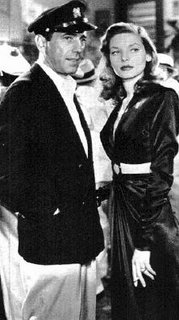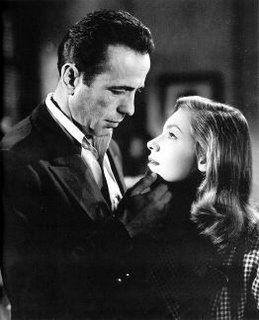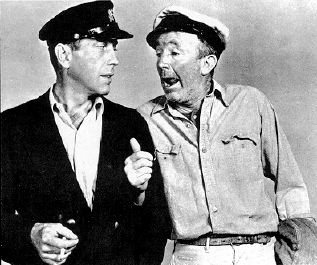Humphrey Bogart - To Have and Have Not

I watched a movie last night that is a great old movie. I have a collection of classic Humphrey Bogart movies. I think I have them all, though most are only on tape instead of DVD.
Last night I watched "To Have and Have Not". The story was written by Earnest Hemingway, so it has an interesting plot, and interesting character development. It stars Humphrey Bogart, and it was the first movie for Lauren Bacall. She is very beautiful in a uniquely sultry way in this film. I think she was only 19 at the time, but it shows how different 19 was at that time vs now.
I like the dialog in those old classic movies like that. Usually it has two or more people talking in a sort of a dance. They each say clever things that express one thing on the surface, but suggest something else under the surface. Each person trying to maintain a certain dignity and a certain level of self-respect, but underneath, they have emotions raging. Bogart and Bacal can have a rapid-fire conversation in non-sexual double-entendres that expresses in a few sentences a complexity of feelings that would take half a film to express in modern films. If they bother to delve to that level. There is a cool, statuesque persona here in both male and female roles. I also enjoy the sophistication of the interpersonal dynamics when there are several people in the room and you can see that they don't all understand the subtextual conversation at the same level. You can see the masters in the room, and you can see those who are only capable of following the surface conversation. It establishes a hierarchy of power and control and influence among the personalities in the room that is purely based on merit and actual intelligence, not just on wealth or position. The romance between Bogart and Bacall became a real-life one and they were married, of course. But they clicked on screen immediately and it shows here. I like how Bogart takes on a dangerous job because he needs the money so he can give it to Bacall so she can find her way back home to the US. (They are in French Martinique in the Carribean during 1940's wartime) He does a selfless act despite the fact that it gets rid of her - because it's just the 'right' thing to do.
The romance between Bogart and Bacall became a real-life one and they were married, of course. But they clicked on screen immediately and it shows here. I like how Bogart takes on a dangerous job because he needs the money so he can give it to Bacall so she can find her way back home to the US. (They are in French Martinique in the Carribean during 1940's wartime) He does a selfless act despite the fact that it gets rid of her - because it's just the 'right' thing to do. I really like the way Bogart's character treats Walter Brennan's character. Brennan is a useless old drunk, limping and lost and driven by his needs - but Bogart treats him like a man. He does not deny him his dignity. And he gives him a fair consideration even when he says things or does things that are ill-thought out, or dangerous, risky, or childish and immature. It's as if he has taken him on as his child in some respects, with unconditional support, but yet still talks to him like he is an equal, and despite his drinking problem and the effects of it, he treats him like a good man.
I really like the way Bogart's character treats Walter Brennan's character. Brennan is a useless old drunk, limping and lost and driven by his needs - but Bogart treats him like a man. He does not deny him his dignity. And he gives him a fair consideration even when he says things or does things that are ill-thought out, or dangerous, risky, or childish and immature. It's as if he has taken him on as his child in some respects, with unconditional support, but yet still talks to him like he is an equal, and despite his drinking problem and the effects of it, he treats him like a good man.
There is a certain noblesse oblige to this. An old-world classiness that I admire. It's as if he can see and appreciate the value of a real human being underneath their disabling behaviors and afflictions and less than flattering circumstances. He doesn't see an old drunk. He sees a faithful and loyal friend who is hampered by an addiction to drinking.
I admire people who are fair-minded, and open-minded and willing to give someone a fair chance despite their shortcomings.
And I like that Bogart does try to help those in need and do the right thing even at personal risk, DESPITE all his self-deprecating comments that would make you think less of him. He tries to convince everyone that he is self-serving and small, but underneath the surface he is world-class.
Of course some people just look at it for 2 seconds and say "It's just an old black and white movie. What else have you got?" and want to move on to color movies and car chases and things blowing up.
And they miss the point entirely. But that's ok. Not everyone is supposed to get it. But as long as SOME of us do....
Don't get me wrong - I love modern movies too. It's just that I also appreciate these old classics for the things that they were great at. And I hope you can appreciate them and enjoy them too.


6 Comments:
Another friend of mine likes older movies. Like me, he enjoys that wonderful period in the early 1970s when studios were willing to take a risk on something different. A major catalyst for that was the phenomenal success of Easy Rider. He said such movies couldn't get made today because there is too much dialogue, too much expected of the viewer, and not enough quick cuts.
As I've recommended elsewhere, some movies by the Coen brothers pay tribute to older American movies. Millers' Crossing is like a Dashiell Hammett story. The Hudsucker Proxy harks back to comedies of the '30s and '40s with quick, snappy lines. The Man Who Wasn't There has the sort of plot twists that James M. Cain did so well.
being a russian myself, the one who lived during the soviet period, there is one thing about old movies I want to tell:
in Russia, the soviet period spawned the best russian movies - why ? because of censorship ! and as soon as the censorship was disbanded - the russian movies nosedived into total crap-ness...
it is common knowledge that the soviet censorship had political purpose, yes, that was the case, but in reality there was no need for political censorship per se - 'cause nobody was even trying to shoot an anti-soviet film, obviously!
so what were all those censors doing? well, they were forcing writers/directors to make their films "better" (as they understood it), and the writers/directors did just that - made their films better - without quotation marks! The resulting films that had passed thru the gauntlet of miriad censors were of much better quality than it would had been overwise.
the films were forced to be not just entertainment, but - what's the word? - edutainment, the film was to be a role model, smthing the folks would look up to, .... the idea was that it is not the film that must "descend" to the level of the crowd, but the viewers are expected to look up to the movie, to "ascend" to it -
- yes, a lot of ideology was a must - still the result was : quality.
Wow, Igor.
That is a fascinating concept. We are so accustomed to thinking of censorship as a bad thing, a way for the big bad government to squash creative ideas and independent thinking, we don't usually allow room for the idea that it can act as a quality control agent to end up improving the quality of the film's end-result.
And I have to say that I love the idea of making movies that are at a higher standard than people, and letting people live up to that standard, instead of the capitalist method where you always target the lowest common denominator in order to get as wide an audience as possible and therefore make as much money as possible.
Fascinating.
Thanks!
v
Thanks to you too, Robert, for the suggestions. That's just the kind of thing I look for.
v
I believe Holliwood had censorship as well, during its golden period up to 60s, for A-movies, at least.
Remember? The length of a kiss, bad guys must lose, etc...
granted, it was not a political one, still ...
I miss it, don't know about you, but it makes me sick that each A-movie today has an obligatory theatrical "sex imitation" scene, no matter whether it's essential to the plot or not... brrrrrrr.
Please, please, please, look here:
http://en.wikipedia.org/wiki/Production_Code
.
Comedian Will Durst once said, "Did you know that Ronald Reagan was considered for the lead role in Casablanca? Just think how history would have been changed. Humphrey Bogart might have become President of the United States . . . but Casablanca would have been a crummy movie."
Post a Comment
<< Home